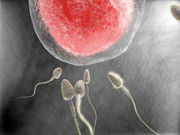Higher rate of live birth, lower risk of ovarian hyperstimulation syndrome
THURSDAY, Aug. 11, 2016 (HealthDay News) — For women with polycystic ovary syndrome seeking infertility treatment, the use of frozen embryos rather than fresh appears to improve the chances for a successful pregnancy, according to a study published in the Aug. 11 issue of the New England Journal of Medicine.
Richard Legro, M.D., a professor of obstetrics and gynecology and public health sciences at Pennsylvania State University in Hershey, and colleagues randomly assigned 1,508 infertile Chinese women who had polycystic ovary syndrome and who were having their first in vitro fertilization cycle to use either fresh or frozen embryo transfer.
The researchers found a higher frequency of live birth after the first transfer when frozen embryos were used (49.3 percent) than when fresh embryos were implanted (42.0 percent). At the same time, there was a slightly higher risk of preeclampsia (4.4 versus 1.4 percent), and newborn death (five deaths versus zero), in women who received frozen embryos. Women given frozen embryos had fewer miscarriages than women given fresh embryos (22.0 versus 32.7 percent). Women given frozen embryos also had fewer instances of hyperstimulation syndrome than women given fresh embryos (1.3 versus 7.1 percent).
Christos Coutifaris, M.D., Ph.D., chief of the division of reproductive endocrinology and infertility at the University of Pennsylvania Perelman School of Medicine, wrote an editorial that accompanied the study and questioned whether the difference in pregnancy rates between using frozen or fresh embryos is significant enough to recommend using frozen embryos. He thinks the distinction should be based on how many embryos a patient has. “In selected cases, especially for women who over-stimulate, the approach to freeze all the embryos is prudent,” Coutifaris told HealthDay.
Full Text (subscription or payment may be required)
Editorial (subscription or payment may be required)
Copyright © 2016 HealthDay. All rights reserved.








